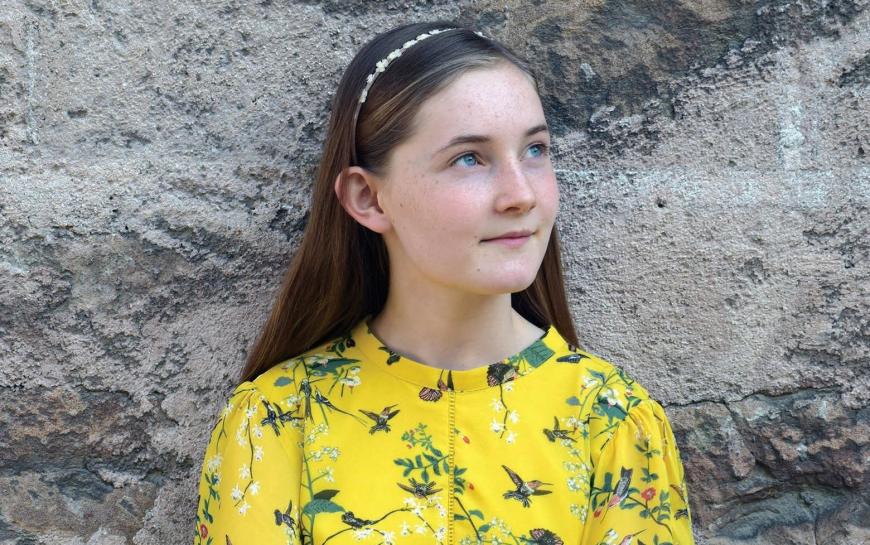
Alma Deutscher’s artistic interests run deep, as you might expect from someone who began playing piano at 2, violin at 3, and composing at 5. She was an avid reader, and Neil Gaiman’s The Sweeper of Dreams inspired her at the age of 7 to write her first opera, which came to her in a dream. She wrote her first full-length opera at the age of 10. It’s a retelling of Cinderella in which Cinderella is a composer and loses not a shoe but a melody. This season’s revival at Opera San José, where the work premiered in 2017, runs Nov. 12–27 and will feature the composer on the podium. Her second full-length opera, The Emperor’s New Waltz (Des Kaisers neue Walzer), will premiere in March 2023 at the Salzburg State Theatre.
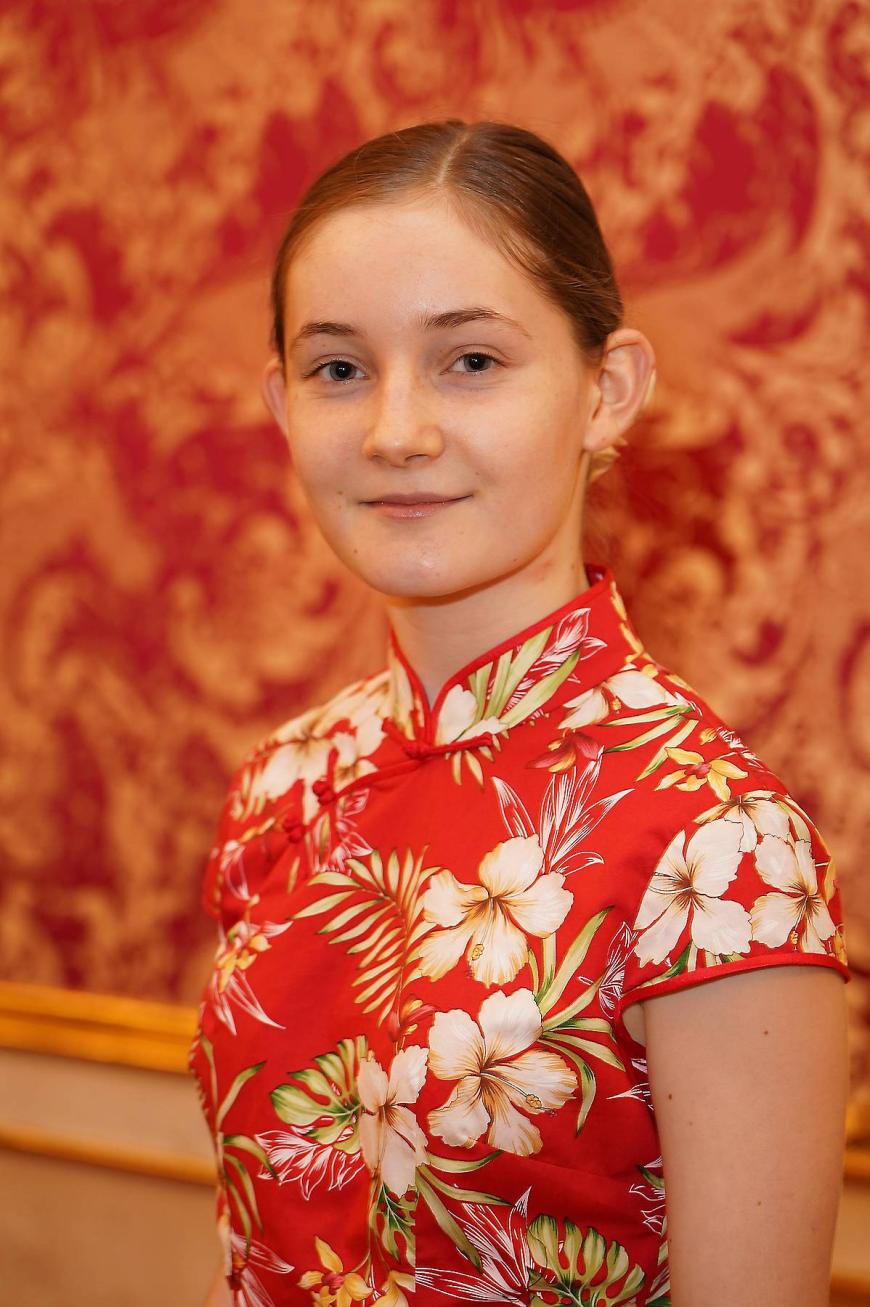
Her music is unapologetically tonal, but the reason for that is simple. Deutscher has said she writes the music she wants to hear. The composer relates that when she was very small, her parents made a CD of lullabies for her bedtime. Richard Strauss’s “Wiegenlied” was her favorite. At the age of 4, she asked her parents, “How can music be so beautiful?” Deutscher’s mother is Janie Steen Deutscher, a specialist in Old English poetry, and her father, Guy Deutscher, is the author of several books on linguistics, including one dedicated to Alma. Her father’s friendship with actor, director, and writer Stephen Fry led to Fry tweeting a video of Alma playing one of her compositions at age 7, which triggered a flood of media interest, leading to an appearance on The Ellen DeGeneres Show at just 8. “I have a special purple skipping rope,” she said to an astounded DeGeneres, “and as I jump, melodies pour into my head.”
Far from a flash in the pan, Deutscher followed up that appearance with a decade of serious musical study and composition, and she now studies conducting at the University of Music and Performing Arts Vienna. Deutscher was raised in Oxford and Surrey and homeschooled along with her younger sister. Almost as startling as her musical talent, Deutscher has a prepossession and grace before the camera and in conversation that is rare at any age. Her enthusiasm for music is nothing short of dazzling. She is the kind of person that it doesn’t seem a stretch to describe as a beam of light.
Now 17, the composer has not outgrown her love of pretty melody and continues to reject the idea that music must reflect the ugliness of the modern world or that beautiful music cannot be serious music. Answering a frequent critique that her music is “ear candy,” Deutscher has said often that there is enough ugliness in the world, one can simply turn on the news, and she doesn’t feel the need to add to it. But with a work from 2019, Siren Sounds Waltz, she takes it a step further, drawing inspiration from the strange sounding sirens in her new hometown, Vienna. “I took some of the ugly sounds of the modern world and tried to turn them into something beautiful,” she said before a sold-out crowd at Carnegie Hall.
Currently in rehearsal for Cinderella in San José, Deutscher is also currently balancing another production of the work at Wexford Festival Opera. Understandably, half an hour is all the time she could afford to spare to speak with SF Classical Voice.
Which of your many talents currently takes your primary focus?
It’s always difficult to find enough time. There are not enough hours in the day. But now for me the main thing is composing. That’s what I always want to do, and that’s what comes naturally out. And now I conduct, so that combines everything together. That’s all my whole music. I always loved performing, not just composing at home and then having other people perform it.
You seem like someone who enjoys working with singers. Is studying singing going to be part of what you work on?
Yes, I already have singing lessons. I always loved singing. When I was 3, I was trying to sing the Queen of the Night. I always loved singing operas to myself, imagining that I was the main character in a beautiful dress.
Both of your opera plots involve a girl musician encountering enormous obstacles. Are you experiencing big obstacles in the music world, or what is your biggest obstacle at the moment?
Well, when you write a story, it doesn’t automatically mean that you’re writing about yourself; it doesn’t mean that because I’m writing about Cinderella, I have an evil stepmother and stepsisters. [Laughs.]
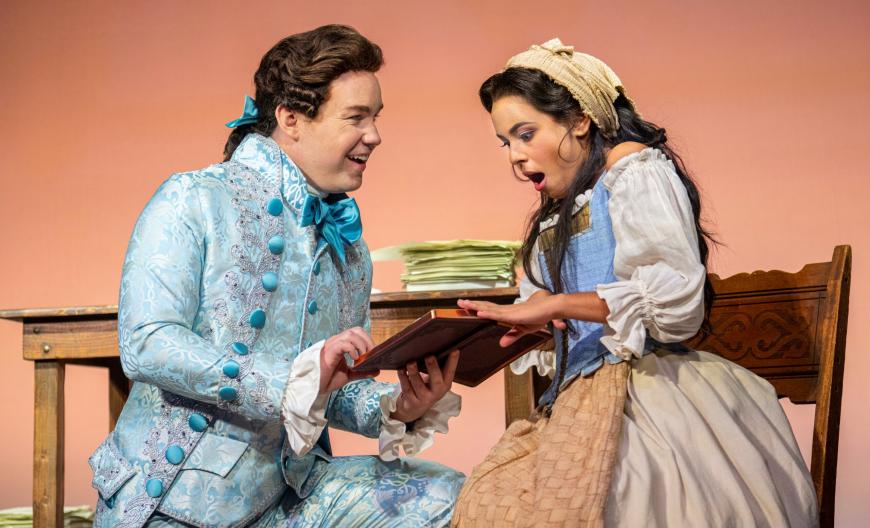
True, but I write fiction, and I always find there is some aspect of myself that comes out in the stories.
Of course, there is always some aspect, but not everything. Cinderella was always, ever since I was very small, one of my favorite stories when the girl triumphs in the end, overcoming the obstacles because of her talent and determination. When I was small, I was quite frustrated because people thought I was just this little girl, and I wanted my music to be taken seriously, but that’s changing now. Now I am the conductor, I’m not this little girl. I’m very happy about it.
Moving from childhood to adulthood, how is that affecting you musically?
I’m always discovering new music I haven’t heard. Sometimes I hear a piece that is strange to me, and I want to try out the harmonies.
Do you have a favorite composer right now?
I don’t have one, there are so many. Schubert. Of course, Mozart. Tchaikovsky. Richard Strauss.
I heard you loved his lullaby very early on.
Yes, and I have studied a lot of his orchestration because I completely revised Cinderella about a year ago.
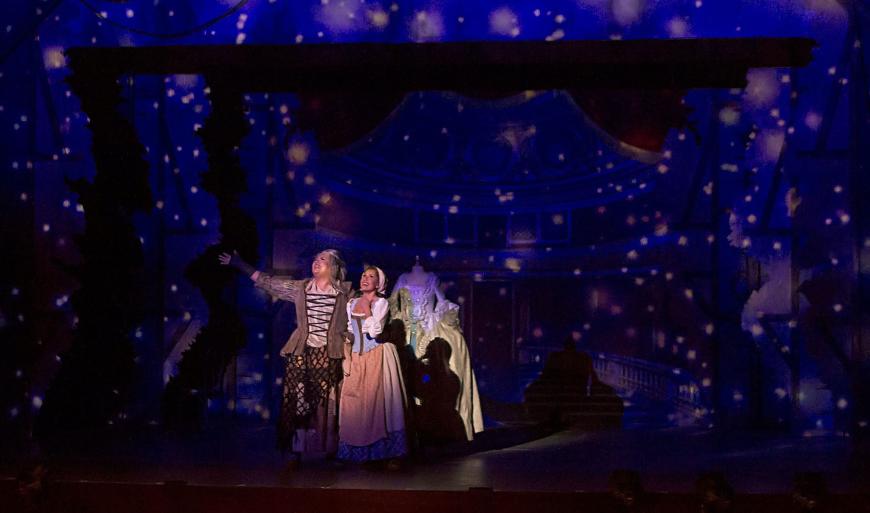
The San José version is a new orchestration from the time you did it before?
Yes, in the years between the last performance, I’ve composed so many other things and orchestra pieces, and with all that experience I felt I could go at it with fresh eyes. And I could listen to the recording and see if it sounded like I imagined it. But not just reorchestrating, I really changed the music to try to bring out much more of the drama or the humor or the passion, to really make the music more reflective of what goes on with the characters.
So, the piece is evolving along with you.
Yes, it grows with me.
Did you go to concerts and the opera often? What was the most inspiring performance you’ve seen or heard in the past year?
I go as often as I can. A month ago, I was at a concert at the Vienna Philharmonic with Martha Argerich. It was quite amazing.
I have a slightly more personal question. You have a younger sister, and I’m a younger sister of an amazing big sister, so I’m kind of wondering what it’s like to be Alma Deutscher’s little sister.
We’re very good friends. Because we were both homeschooled, we would play and laugh with each other, and now she has her own interests. She’s a great actress and loves animals, and she’s also very talented with music, and we play together, though I don’t think that’s her main focus.
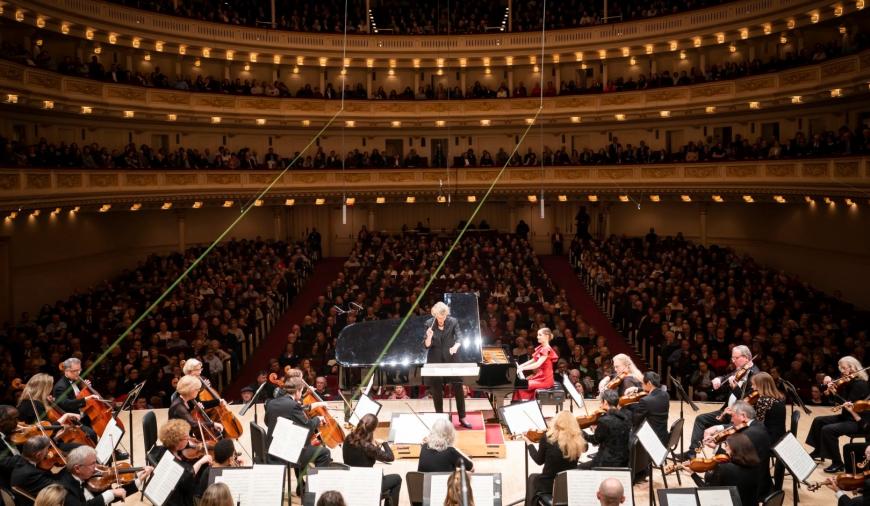
Thinking of the classical music world more broadly, is there anything that you want to change?
The dream of what I’m doing is I want to bring operas, orchestra, and symphony performances to young people. So many young people have come to me and told me that they didn’t have any access to this kind of music. And they heard some piece of mine, so they were so inspired, they wanted to write themselves, or it led them to hear other music like this, and that makes me so happy. I also want to inspire other young people to compose; then music is a living thing.
You seem to have been overflowing with creative energy from such a young age. I don’t mean to make you a self-help guru, but how do you keep the creative juices flowing? What is your secret, Alma Deutscher?
I am generally an energetic person. When I was young, I had enormous energy. Every time I read a novel, I wanted to write a novel. Every time I heard a symphony, I wanted to write a symphony. I wanted to do everything. Now it’s not quite the same. I don’t have as much time because I have performances. But I think because I am having so much fun, that is why I have this energy. I am doing what I love. I think the most exciting thing for me is when I create something. It is sometimes true, there can be pressure to do something wonderful, so I always try to tell myself, “Not everything you compose can be amazing.” And then, some things, hopefully will be. But you can’t say, “Everything that I write must be amazing.”
I think perfectionism is the enemy of creativity.
Exactly. You just hope something will be beautiful.




